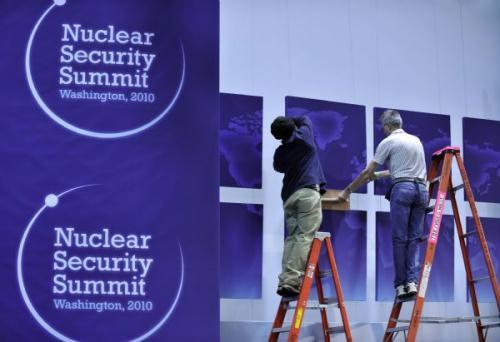Sensitivities to complicate Nuclear Security Summit in Washington: paper
2010-04-12 17:31 BJTSpecial Report: Hu Attends 2 Summits, Visits 3 Nations |
LOS ANGELES, April 11 (Xinhua) -- A number of sensitivities would complicate the upcoming Nuclear Security Summit in Washington, the Los Angeles Times said on Monday.
 |
| Workers do the final preparation work in the Washington Convention Center in Washington D.C., capital of the United States, April 11, 2010. The Nuclear Security Summit will be held at the Washington Convention Center on April 12 and 13. (Xinhua/Zhang Jun) |
"Many countries are highly sensitive to foreign powers' intrusions in their nuclear programs, for example, and would resist international efforts to force them to give up closely held information or allow inspectors to monitor their facilities," the paper said in a report from Washington.
There is even disagreement about the extent of the threat. While some countries, such as the United States and Russia, believe the threat of militant groups acquiring nuclear weapons should be the priority, some European leaders are more concerned about so-called "dirty bomb" radiological materials, which would be much more easily acquired, said the paper, quoting Sharon Squassoni, a former U.S. official at the Center for Strategic and International Studies.
Many non-nuclear states see the loose nukes agenda as the Americans, the world's dominant nuclear power, were "asking us to do more, and spend more, to make you feel safe," Squassoni was quoted as saying.
Israeli Prime Minister Benjamin Netanyahu canceled plans to attend because he feared Egypt and Turkey were going to embarrass Israel with complaints about the unacknowledged nuclear program Israel is widely assumed to have, the paper said.
A senior Arab official involved in summit planning insisted that the Arab countries had no such plans, the paper said.
"There was no intention to politicize the outcome of the summit, " said the official, who declined to be identified because of the sensitivity of the issue.
Obama administration officials have been quietly trying to craft a common position for world powers that remain sharply divided on the best way to safeguard bomb-making materials, the paper said.
The two-day summit, which begins Monday, is billed by the White House as the biggest conference of its type in the U.S. since the 1945 conference to create the United Nations. Leaders from more than 40 countries will attend the summit.
Editor: Jin Lin | Source: Xinhua
 Mail
Mail Share
Share Print
Print


 Video
Video









 2009 China Central Television. All Rights Reserved
2009 China Central Television. All Rights Reserved